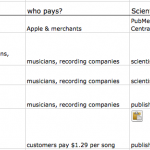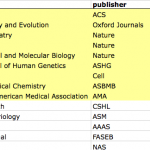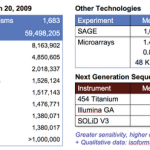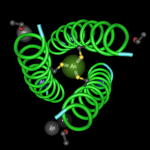
I've heard you have to sing loud if you want to change the world.
Cloning DNA – lyrics by Sandra Porter, sung to the tune of Surfin' USA
C ..................G7..................C
If everybody had a plasmid, across the U.S.A.,
C ..................G7..................C
then everybody'd be cloning, with their DNA
................................F
You'd see them wearing their goggles.
.................... C
and their lab coats, too
.............G7 ...............C
multicolored gloves on, cloning DNA
C…
If all the information you had about scientific careers came from newspapers or TV, it would be easy to think that everyone who works in life sciences / biotechnology is either a Ph.D. scientist, post-doc, or graduate student. In reality, the life sciences are more like an iceberg. The public sees the people at the top, with advanced degrees, while the many people who have bachelors or associates degrees are hidden from view.
The NIH has realized that a fair number of people they hire are community college graduates who have associate degrees in…
Many of you may remember a time when music-stealing was rampant on the internet. Apple changed this situation by establishing a new kind of marketplace.
Now people pay for music and download it from iTunes.
What if there were a third party group, with an iTunes-like model, where scientific publishers would make papers available for purchase? Could this kind of model work?
Two arguments support this idea.
1. Volume sales
2. The cost of creation
Volume sales
Volume sales work like this. Let's say a publisher sells 10 papers at $30 each. This brings in $300…
The Backstory: As it stands today,when one of the National Institutes of Health (NIH) provides the funding for a scientific research project, and those results are published, they must be made freely available to public, within a set period of time. The reasoning behind this requirement is that taxpayers funded everything about the research except for the final publication, and so they have already paid for access.
The Research Works Act (#RWA), HR 3699, is a bill in the House of Representatives that would roll back this requirement. If it passes, taxpayers will…
The C.R.E.A.T.E. strategy is an approach to making biology teaching a better model of biology, the science.
From the C.R.E.A.T.E website,
...C.R.E.A.T.E. teaching focuses on on authentic published work--peer reviewed journal articles--with students reading either series of papers produced sequentially from individual labs or series of papers from different labs focused on a single line of research.
This summer and next, the National Science Foundation is funding two identical workshops designed to help instructors learn how to use the C.R.E.A.T.E. strategy.
These will be held in June 2012 and…
This morning, I learned that congress wants to reverse the advances made by NIH and go back to restricting access to scientific publications. Congresswoman Carolyn Maloney (New York) and Congressman Darrell Issa (California) are co-sponsoring a bill to restore the limits on public access to NIH-funded research.
I've written many times before (here, here, here, and here) about the challenges that community college faculty and students have in getting access to scientific papers.
In an era where the economic benefits of educating students in science are well-known (1), the idea of crippling…
In simple Mendelian genetics, a single change in one gene can produce a large change in mortality. The National Human Genome Research Institute (NHGRI) will be funding genomics studies on Mendelian traits using a similar strategy.
NHGRI will fund a small number of centers, dominant centers you might say, and look for large changes. The sequencing centers that will benefit are the Broad Institute, Washington University, and Baylor College of Medicine. For the next four years, the big three will be dividing $86 million a year according to a press release from NHGRI. I'm not sure what algorithms…
Like everything else, if we want to know what's going on, we have to ask.
So, it's time once again for the 2011-2012 National Biotechnology/Life Sciences Program Survey.
Yes, indeed.
Federal and state agencies will use the results to determine how best to support programs like yours. This study will also help prospective students and industry employers find your program. Survey results will be available to you to help with program planning, grant activities, and more.
We only want one person from each biotechnology / biomanufacturing / bioscience program to complete the survey. If you are…
What roles should community colleges play in training the bioeconomy workforce of the future?
Send your answers to bioeconomy@ostp.gov by Dec. 6th.
One night towards the end of October, we happened to meet with someone who could tell us more.
We asked him about a request for information (RFI) soliciting input on the bioeconomy, that some of us saw posted on the Federal Register web site.
"What could information could we provide?," We asked (a little skeptically).
"Does the Whitehouse really want our input on ways to stimulate the bioeconomy and build the bioscience workforce?"
"Yes," he…
For the past few days I've been avidly following Daniel MacArthur's tweets from the Personal Genome Conference at Cold Spring Harbor(@dgmacarthur #cshlpg).
The Personal Genomics tweets aren't just interesting because of the science, they're interesting because MacArthur and others have started to take on the conventional dogma in genetic ethics.
For years, there has been a strong message from the clinical genetics and genetics education community that genetic information is dangerous.
Unlike the other medical tests we're continually urged to get (mammograms, blood pressure readings, sugar…
"It's all about saving Aunt Millie"
Bob Swanson
Co-Founder of Genentech
I just learned today that Jim DeKloe, who wrote this post as a guest author a few years ago is giving a webinar on May 11th on protein purification from industrial enzymes to cancer therapy.
Jim's webinar, offered through Bio-Rad, has two sessions at 3 pm Eastern and 7 pm Eastern. Registration is free and you can register HERE.
Jim is one of the most inspirational educators I know and he's the sort of person that reminds you why educating students about biotechnology careers is important. His moving story is one that…
The National Science Foundation recently announced an ambitious plan to transform biology education across the United States called "Vision and Change." Funding for this mission is being provided by a new NSF grant program called "TUES" for Transforming Undergraduate Education in Science.
This finding may have been a surprise to some, but two year colleges have a disproportionate impact on biology education in the U.S. (1, 2). At least half of the country's biology students are enrolled at two year colleges. Additionally, community colleges often provide the only college-level biology…
It only takes a quick trip to the grocery store to see that familiar jobs are vanishing. Unless you're in Oregon, grocery store checkers are going the way of gas station attendants, travel agents, and secretaries. Jobs are changing, new jobs require different skills, and even those jobs will be obsolete within a short time.
Community colleges can cushion the blow by developing education programs in response to the needs of their local communities.
Not only do these programs help displaced workers, they help their communities attract new businesses and support economic growth. Georgia's…
Last night we went to see "The Agony and the Ecstasy of Steve Jobs" by Mike Daisey. Two hours vanished as we sat riveted and listened to interspersed stories of Apple and Shenzhen. Mike spoke of Apple and computers as a lover, familiar with the details, and knowledgeable in the special language of geeks and engineers. He was hysterically funny.
And we all understood.
After all, the night at the play was organized as a spring celebration by the Washington Technology Industry Association, a group intimately familiar with the ways of tech.
From the music preceeding the show, to Mike's…
This morning I attended a "bloggers-only" conference call with Dr. Eric Green and the folks from the NIH Human Genome Research Institute (NHGRI) to hear about NHGRI's new strategic plan. The new plan represents a shift away from viewing the genome through a lens marked "for research use only" and towards the goal of making the genome useful as a clinical tool. As a consequence, we will see a greater emphasis on funding activities that support clinical work. For example, it's not always clear how variations in the genome are related to disease. NHGRI might fund projects that help sort and…
Have you ever wondered if creationism was intelligently designed?
Most of my colleagues tend to dismiss creationism as generally nutty and not worth bothering about. But, every now and then, we did get the odd situation with a few students who disagree or state legislatures that get a little confused about the definition of science.
This video lecture is a bit long, but definitely interesting.
Disclaimers - just so you know...
This information is cross-posted at www.bio-link.org
All the data and graphs in this post were obtained from Simplyhired.com.
I do not have any kind of commercial affiliation with this company I found their site via GenomeWeb.
Having worked around biotechnology for several years, I thought I was pretty familiar with biotech job descriptions.
I decided to test this assumption by playing with the data at SimplyHired.com.
Being able to quickly search with different terms and examine trends in job postings has proved to be an enlightening experience.…
I had the good fortune on Thursday to hear a fascinating talk on deep transcriptome analysis by Chris Mason, Assistant Professor, at the Institute for Computational Biomedicine at
Cornell University.
Several intriguing observations were presented during the talk. I'll present the key points first and then discuss the data.
These data concern the human transcriptome, and at least some of the results are supported by follow on studies with data from the pigmy tailed macaque.
Some of the most interesting points from Mason's talk were:
A large fraction of the existing genome…
About mid-morning, my 16yr old daughter called me from school and asked me to help her get an interview transcript that was on her computer.
Four years ago, when my older daughter was in high school, I would have printed that document and driven to the school to deliver it.
Not today.
Today, I found the document on YD's computer, opened a browser, logged in to Google Docs, uploaded her file to my Google Docs account, and set the sharing settings so that YD could log in from school and get the document, which she did.
No one had to drive to the high school. No child had to stand outside in…
It's been interesting to watch as microbiology's own cold fusion debate has been raging. It began with an extraordinary claim about bacteria using arsenate as a replacement when phosphate concentrations are low (1).
It progressed when at least two scientist / bloggers ( here, and here) (not bloggers! the horrror! how uncivil!) gave public "journal club" presentations on blogs (envision dripping slime).
It continued with the science journalists lamenting about having swallowed the hype.
And it seemingly ended with another scientist / blogger's post that seemed to equate discussions…




